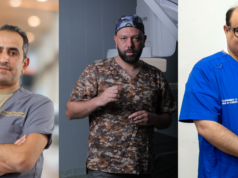
Eric J Keller and Tauqir Rana discuss a session at the Pan Arab Interventional Radiologists Society Pan Arab (PAIRS) annual congress (10–13 February, 2024, Dubai, United Arab Emirates) featured the first session on ethics in IR in the region, discussing issues such as futility, surrogate decision-making, and conflicts of interest.
The session stimulated a lively discussion and highlighted important cultural differences, which can shape these challenging issues faced in IR practice.
Futility was the first issue raised. Interventional radiologists often care for critically ill patients and can be faced with requests for procedures that offer little chance of benefit. Common examples include gastrostomy tubes in patients with severe dementia or numerous biliary drains for patients with advanced cancer and malignant biliary obstruction. Advance care planning and partnerships with palliative care can be helpful in navigating these requests. Perceptions of value, risks, and preferences vary widely, so it is important when faced with these requests to understand the patient’s and family’s goals of care and values to differentiate palliative from futile care.1
The talk then transitioned to consent and surrogate decision-making. The audience raised questions about family requesting that elderly patients not be told about their terminal diagnosis and how to facilitate informed consent when patients and family defer to whatever the doctor thinks is best in certain cultures. The modern ideal of consent has moved away from paternalism (what the doctor orders) as well as deferring solely to patient autonomy (whatever the patient/ family wants). Rather, we are challenged to facilitate shared decision making where we respect patients’ preferences and encourage their involvement in the decision-making process but also offer recommendations and guidance as content experts.2 Patients have a right to know/make decisions about their care, but they also have the right to defer to others to make decisions on their behalf, and this preference should be respected.
The audience was then asked about requiring suspension of Do Not Resuscitate (DNR) and Do Not Intubate (DNI) orders to have an IR procedure. American surgical and anaesthesia guidelines have recommended against requiring suspension for procedures, advising that code status should instead be rediscussed. Yet, a study3 of IR practices in the USA found that about a third of practices require the patient to be full code for IR procedures. Most participants agreed with required suspension, noting that their anaesthesiologists (and selves) want the ability to resuscitate their patient if something happens intraoperatively.
The final questions raised involved conflicts of interest and relationships with industry. Conflicts of interest (COIs) are a natural part of professional life and are not always financial. The issue is not necessarily to the existence of conflicting interests or relationships with industry, but the potential bias caused by these relationships. Interventional radiologists’ relationship with industry is viewed as invaluable, but the question becomes how can we effectively manage bias associated with these valuable relationships? Improving disclosure of potential bias is likely the most practical solution. For example, a recent study found 0% disclosure of relevant financial COIs among social media posts.4
The PAIRS 2024 Applied Ethics in IR session was critical in initiating these key conversations across the world of IR. We hope to continue raising important issues facing our specialty to develop practical strategies and tools to help navigate them across cultures.
References:
- H D Rockwell, et al. Utilisation of Goals of Care Discussions and Palliative Care Prior to Image-Guided Procedures Near The End of Life. Clinical Radiology. 2022 Feb 14; 10.1016/j.crad.2022.01.050.
- Tia Forsman, et al. Consent in Interventional Radiology—How Can We Make It Better? Canadian Association of Radiologists Journal. 2022 May 25; 10.1177/08465371221101625
- Eric D Cyphers, et al. Required Suspension of Do Not Resuscitate and/or Do Not Intubate Orders in Interventional Radiology: A Survey of Prevalence and Practices. Journal of Vascular and Interventional Radiology. 2022 Dec 20; 10.1016/j.jvir.2022.12.032.
- Thomas Webb, et al. The Prevalence of Financial Conflict of Interest Disclosures by Endovascular Specialists on X (Twitter). Journal of Vascular and Interventional Radiology. 2024 March 19; 10.1016/j. jvir.2024.03.017
Tauqir Rana is a consultant interventional radiologist at King Faisal Specialist Hospital, Riyadh, Saudi Arabia and Eric J Keller is a senior IR resident at Stanford Health Care, Stanford, USA.










